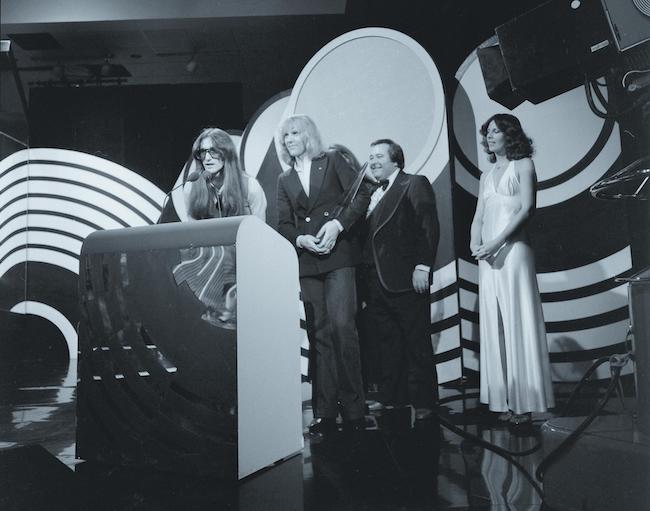Tracing the evolution of heavy music at the JUNOS begins with one band. In fact, with one word: Rush.
Once described by its bassist and lead vocalist Geddy Lee as “the most popular cult band of all time,” Rush — which included lead guitarist Alex Lifeson and the late drumming icon and lyricist Neil Peart — not only thrust Canadian heavy music onto the world stage, it became a foundational pillar of progressive rock. In 1975, a year prior to the release of their landmark album, 2112, the group was named the Most Promising New Group of the Year; a milestone that would culminate with their induction into the Canadian Music Hall of Fame in 1994.

Rush accepts the 1978 JUNO Award for Group of the Year. Credit: PlumCom Bruce Cole
The formal acknowledgment of heavy music at the JUNOS is best understood as a rollercoaster of ebbs and flows: one that’s aligned with changing perceptions of what constitutes “metal,” and how critics and audiences champion its merits. In the 1970s and 1980s, bands like Prism, Saga and Trooper — bands attempting a loose and poppier approximation of the sound of British Heavy Metal — all received recognition. However, it wasn’t until 1991 that the JUNOS added the category of Best Hard Rock/Metal Album, with Rush becoming the inaugural winner for their album Presto.
Though the award dropped “metal” from its title the following year, the introduction of the category was indicative of a larger cultural alignment — one that both observed the rapid rise of alternative rock and grunge, and sought to solidify Canadian contributions to the genre and its offshoots. In the early ’90s, nominees represented the diversity of heavy music coming out of Canada: pioneering heavy metal bands KiLLeR DWaRfS and Triumph were nominated for their albums, Dirty Weapons and Edge of Excess, respectively; and female vocalists like Lee Aaron and Chrissy Steele were redrawing the lines of who was allowed entry into the historic boys’ club of rock music.
The back-to-back nominations of iconic metal outfit Voivoid from Jonquière, Quebec are particularly illustrative of the period. By blending blistering thrash with the technical dexterity of progressive metal, the band picked up nominations in 1991 for their commercially successful album Nothing Face, which charted on the Billboard Hot 100, and again in 1993 for their follow-up Angel Rat, which became a cult favourite.
By 1996, the award dropped the “heavy music” designators from the title, and became a placeholder for recognizing a broad range of alternative rock acts. The decision was in line with a history of metamorphosis and constant evolution — one that blurred the lines of sonic classification and taxonomy to meet the needs of the present, and anticipate the future. Despite metal-adjacent bands like Alexisonfire, Cancer Bats, Danko Jones and Protest The Hero — all of which managed to pick up nominations in the new millennium — an accurate reading of the history of the awards, and especially its fluidity in defining “heavy music,” continues to invite inquiry. Why has only one female artist, Alanis Morissette, ever won the JUNO Award for Rock Album of the Year? Or, why have female artists like Avril Lavigne and Fefe Dobson, who both make music inspired by the spirit of rock, often been excluded from histories of Canadian rock?
In 2011, more than two decades after the phrase “metal” was stripped from the JUNOS, a new category was created: The JUNO Award for Heavy Metal Album of the Year, exclusively devoted to championing heavy music, and the result of a campaign by legendary Hamilton label Sonic Unyon. The award went to Winnipeg-based trio KEN Mode for their 2012 breakthrough, Venerable, laying the foundation to champion acts whose recognition was long overdue. Namely, legendary and beloved Quebec death-metal band Gorguts, who, 25 years after forming, received a nomination for their long-awaited follow-up record, Coloured Sands.

KEN Mode takes home the 2012 JUNO Award for Heavy Metal Album of the Year. Credit: CARAS/iPhoto.
In a 2012 Toronto Star interview, KEN Mode’s Jesse Matthewson deftly summed up the award’s coming of age. “It’s nice that Canada’s finally waking up to appreciate some of the darker arts.”
Featured Image: Voivod accepts the 2019 JUNO Award for Metal/Hard Music Album of the Year. Credit: CARAS/iPhoto.